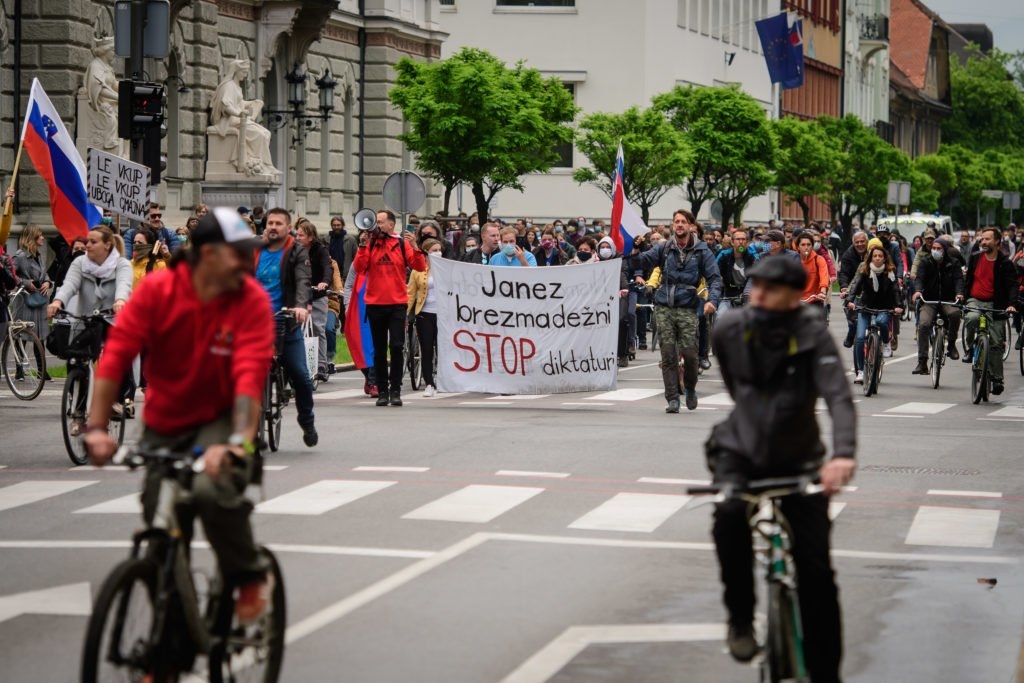In Slovenia, there are as many as 27,854 registered non-governmental organizations, latched to the state budget, so it is not surprising that several thousand protesters can easily gather. The current Government has upset the non-governmental organizations, as it is striving to reduce the funding and impose certain restrictions, of which there is not even a trace of when the left-wing governments are in power.
Of the 27.854 non-governmental organizations, 24,092 are associations, 3,503 are institutes, and 259 are institutions. The fact that the number of non-governmental organizations, which had as much as 918 million euros in revenue in 2018, keeps increasing for as much as 500 per year, is telling! It is clear that there is a huge amount of money involved in the financing of the NGOs, which allows many of the non-governmental organization members to live a carefree lifestyle.
The share of public funds they receive is constantly increasing
The Centre of Non-Governmental Organizations (Center nevladnih organizacij – CNVOS) presented the results of analysis last year, which revealed that in 2018, the non-governmental sector had as much as 918 million euros in revenues. Over the last decade, the revenues of non-governmental organizations have been increasing, which is not surprising, given that the number of non-governmental organizations has also been growing. During this period, the amounts allocated by the state to the non-governmental sector have also increased. The Peace Institute (Mirovni inštitut) is one of the NGOs that are receiving quite a decent amount of funds from the state budget.
The Peace Institute is a “strategic centre” for the strengthening of Marxism, communism, anti-family ideologies, the spread of the so-called reproductive rights, and LGBTQ radical interests. Ever since it was founded on April 24th, 1991, it has been receiving a decent amount of funds from the taxpayers. According to the information from the Supervisor application, it received an incredible amount of 2,335,096.89 euros only from the Slovenian budget sources, in the years between 2003 and 2017. This amount does not include the European budgetary resources, to which Slovenian taxpayers also contribute. In addition, they are richly rewarded for their work and fight against the opponents of the political left with money from abroad.
When it turned out last year that some Slovenian non-governmental organizations were actively helping illegal immigrants with illegal border crossings and were even giving them instructions on how to abuse the international system of protection, there were calls for more efficient state funding. All of this is possible, of course, because the left-wing governments are strongly in favour of NGOs. When the non-governmental authorities learned that Janez Janša’s government was coming to power, all of their alarms started ringing. In particular, the non-governmental organization members are said to be bothered by the “amendment to the first anti-corona legislative package,” but the truth is hidden elsewhere, in money and greed.
They even appealed to the Constitutional Court of the Republic of Slovenia
It is, therefore, not surprising, that three non-governmental organizations even filed an initiative with the Constitutional Court to review the compliance of the first anti-corona legislative package with the constitution, which sets stricter conditions for the participation of non-governmental organizations representing the public interest in the procedures of issuing integrated building permits. The NGOs are problematizing this because it prevents the participation of most non-governmental organizations. According to STA, the Focus Association for Sustainable Development (Društvo za sonaraven razvoj Focus), the Slovenian Native Fish Society (Društvo za preučevanje rib Slovenije) and Lutra – The Institute for Conservation of Natural Heritage (Lutra – inštitut za ohranjanje naravne dediščine) oppose the added condition that the NGOs must have at least 50 active members, as evidenced by regularly paid membership fees and participation in members’ meetings. Institutions are required to have at least three full-time employees with a master’s degree (former bachelor’s degree) or higher and education from the field of non-governmental organizations, and the institutions must also have at least 10,000 euros in assets at all times.
Unlike the non-governmental organizations, the Chamber of Commerce and Industry of Slovenia supports the legal innovations of the Ministry of the Environment, as it has happened several times in practice that the right balance between environmental protection and public benefits has not been reached. Thus, projects that were strategically important had to be stopped, which caused great damage to society. Despite the non-governmental organization members shouting about how the Government will tie their hands with this, it is clear that this is not true. This was also pointed out by the Minister of the Environment Andrej Vizjak, who emphasized that the projects that go through the procedure will still have to obtain all the consents of the competent opinion givers, both the Institute for Nature Conservation (Inštitut za varstvo narave), as well as the Environment Agency (Agencija za okolje). “This is about preventing some marginal NGOs from harassing those involved in the procedures. In fact, it prevents the possibility of filing a complaint, without any previous participation in the procedure,” he pointed out and made it known that a non-governmental organization with less than 50 members can in no way be a defender of nature conservation.
When the left-wing governments caused devastation for the environment with the projects of Magna, Kemis, and Janković’s sewer canals over the C0 drinking water catchment area, no one was there to fight them. Or they only interfered enough to be able to file the complaints, which they then withdrew in exchange for money. This time, of course, it’s different. Janez Janša is in power, who told the non-governmental organizations to stop. Since the left is not currently in power to provide great funding for them with our money, they are determined to eagerly protest on their bicycles every Friday. Whatever it takes for them to get their own piece of the pie; endangering of public health is more than obviously not important to them.
Hana Murn

